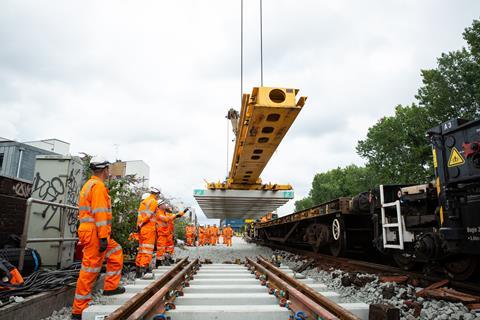
UK: Network Rail has published its small and medium-sized enterprise strategy for Control Period 7 in 2024-29, saying it will build on progress made in CP6 and renew its focus on enhancing transparency and the visibility of business opportunities.
CP7 will see Network Rail working closer with strategic partners, so its SME strategy has evolved to try to ensure that direct or indirect procurement opportunities are inclusive and accessible to SMEs and they have the opportunity to compete on a level playing field.
‘Supporting SMEs brings numerous benefits, including innovation, cost-effectiveness, local economic growth, competition, diversity, regional knowledge, and technology adoption’, said Group Commercial & Procurement Director Tracey Williamson on November 6. ‘These are crucial for achieving our CP7 goals, and we remain committed to providing opportunities for SMEs to work on the railway.’
The government set a target for Network Rail to allocate 33% of its annual expenditure to SMEs by 2022. It achieved 33·1% in the 2022-23, spending £1·29bn with around 3 000 SMEs plus an additional £1·78bn indirectly through its tier-one suppliers.
Changes to facilitate this included alterations to financial guarantees and insurances, a reduction in the use of nil value frameworks, providing standards for free, prompt payments and publishing more meaningful sourcing pipelines.
NR said the Procurement Act 2023 which is due to go live in February 2025 would further support SMEs, as contracting authorities will need to identify the barriers faced and what needs to be done to help overcome them.
Commenting on the strategy, Chair of the Railway Industry Association’s SME Group Catherine Leech said RIA is ‘particularly glad to see that there is a commitment to increase the number of SMEs in the supply chain. Something we would like to see in the current Control Period’s strategy is a more detailed breakdown of SME spending into categories.’



